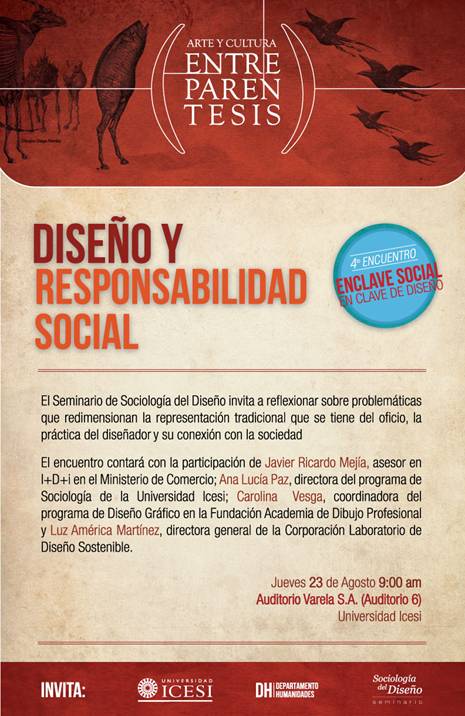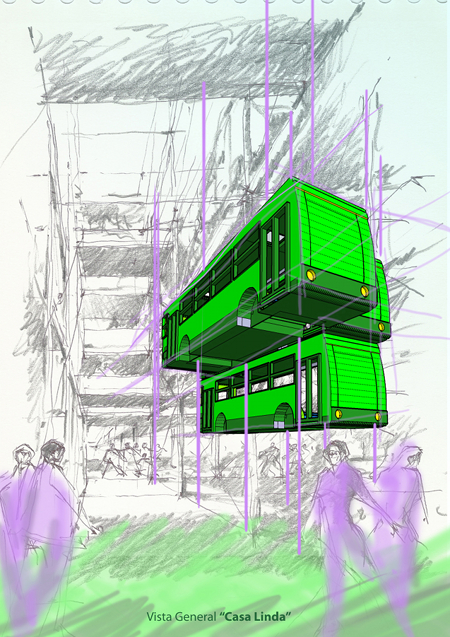Blog
The atlas of practicalities by Ricardo Mejia – #RefugeeChallenge @WhatDesignCanDo
The atlas of practicalities is a public YouTube channel that collects, promotes, and manages micro-documentaries to inform people about practicalities of a host country. The channel can attend a broad audience like refugees, expats, tourists, among others.
El diseño y la innovación social para el desarrollo humano
Desde hace ya varios años me han venido interesando profundamente las relaciones entre ciencia, tecnología y desarrollo humano. Gracias a la amable invitación realizada por la Universidad Autónoma de Occidente me fue posible re-estructurar la presentación “El diseño y la innovación social para el desarrollo humano”, gracias a Sara Ibarra por las ilustraciones.
Esta presentación aborda las diversas formas de conceptualizar la pobreza, los diferentes enfoques para la intervención social [dimensión instrumental] y el Capital Social [¿innovación social?] y el Enfoque Marco [¿innovación social?] llegando a concluir un modelo simple del diseño y la innovación social para el desarrollo humano.
Javier Ricardo Mejía Sarmiento
Txatarra: transitional housing in public transport buses / Txatarra: Vivienda transitoria con buses de transporte público
Mejia Sarmiento, J. R., Arenas Vargas, J. P., & Jaramillo Carling, P. J.
This analysis of the Casa Linda project sets out a conceptual exploration into sustainable environments through the reuse of public transport buses, which would otherwise be scrap. While rethinking the process of shaping the material environment, the inadequacies of traditional methods became evident. In this traditional approach, it is normal to use raw materials that are formed depending on the project’s requirements, in standard ways, and for previously defined ends. Approaching a project starting from recycled objects and materials (scrap) of different sizes and in rough condition, generated a process characterized by the impossibility of anticipating or controlling the construction procedure and final result.
Keywords: reuse, recycling, public transport, transitional housing, prefabrication.
Read the full paper here: dearq_08_08_j_r_mejia_cs_0.
Read the full journal here.
Cited (APA) as: Mejia Sarmiento, J. R., Arenas Vargas, J. P., & Jaramillo Carling, P. J. (2011). Txatarra: vivienda transitoria con buses de transporte público. Journal of Architecture Universidad de los Andes. Page 80-87. ISSN-2215-969X.
Summary (Spanish):
El proyecto propone la transformación de vehículos de transporte público (buses, busetas y colectivos), que serán chatarrizados, en módulos de vivienda o modulos complementarios para viviendas existentes. Es un nuevo medio para configurar sistemas constructivos diferenciando zonas de servicios privados, sociales e íntimos en medio de relaciones interpersonales ideales, permitiendo “que los niños duerman separados de los adultos” entre otras cosas. La propuesta tiene un sistema constructivo base (que para vivienda nueva es una torre en concreto y estructura en tuberías y perfiles industriales y para los módulos complementarios es la vivienda existente) que funciona como punto fijo (Zonas de Servicios) al que se le podrán acoplar los buses pre-configurados como módulos de vivienda luego de ser desmantelados. El uso de estos materiales reciclados garantiza la calidad de la construcción y permite asesoría directa por parte de diversos actores en diferentes fases del proyecto constructivo.
Participación en el “Enclave social en clave de Diseño” Jueves 23 de Agosto 2012 en la Universidad ICESI en Cali.
 El Seminario de Sociología del Diseño invita a la cuarta versión de este evento “Enclave social en clave de Diseño”, que tiene como objetivo reflexionar sobre problemáticas que redimensionan la representación tradicional que se tiene del oficio y la práctica del diseñador. Ética y diseño, el compromiso social del diseñador, el Diseño y su relación con otras disciplinas, serán algunos de los temas a tratar en el encuentro.
El Seminario de Sociología del Diseño invita a la cuarta versión de este evento “Enclave social en clave de Diseño”, que tiene como objetivo reflexionar sobre problemáticas que redimensionan la representación tradicional que se tiene del oficio y la práctica del diseñador. Ética y diseño, el compromiso social del diseñador, el Diseño y su relación con otras disciplinas, serán algunos de los temas a tratar en el encuentro.
PANCOGER – EMPRENDIMIENTO A PARTIR DE HUERTAS COMUNITARIAS PANCOGER – ENTREPRENEURSHIP BASED ON COMMUNITY GARDENS
How would describe the agriculture development challenge you are trying to address to a 5 year old?
The team-group considers the consolidation of food-sovereignty (FS) as one of the most important challenges that global agriculture is facing right now. One of the key demands for FS is to get out the food from a regular -speculative- capital markets and that the food should not be longer subjects of coercion and it to be vehicles of strengthen political and economic hegemonies for the vulnerably people in the country, especially important for communities where the agriculture is the key economic activity. According to this framework the “future agriculture” that the team-group is conceptualizing should point to strengthen local production that should be capable to cover the whole community needs for food and rehearse values of cultural-identity linked to these activities.

